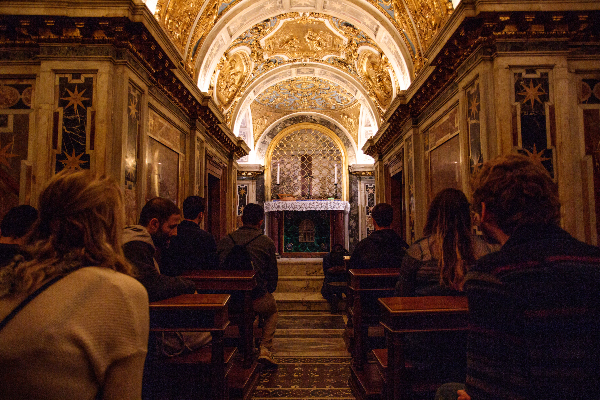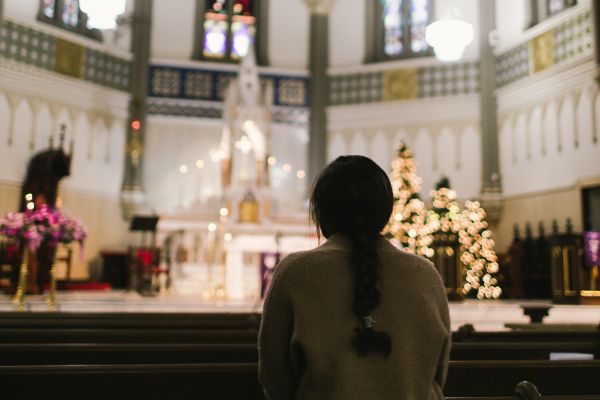I know the key to your prayer life. Really. There is something Jesus taught us about prayer and it is the most important teaching on prayer ever recorded. He wanted you to know it, and, in fact, you probably already do. You’ve likely said it a thousand times. Whether you realize it or not, the key, the secret to your prayer life is hiding in plain sight.
It’s the “Our Father.”
Underwhelmed? Looking for something more? Wish I had told you about something you hadn’t heard of before?
You shouldn’t be. Take a walk with me for a moment, because I believe that if you really prayed the “Our Father,” if you let it be your guide for prayer and not just some words you mumbled, your prayer life would absolutely blossom.
Why do I believe this?
Consider Luke 11:1-5. The apostles approach Jesus, and ask him, “Teach us how to pray.” Pause for a moment. Don’t miss the significance of these few short verses—Jesus, God Himself, teaches the Apostles how to pray. Of all the things that Jesus could have said, this is the one thing He wanted to teach the apostles (and us) about prayer.
If we want to learn how to pray, these are the words we need to study. The “Our Father” is what Jesus wanted to teach us about prayer. So, let’s dive in.
Getting Our Prayer in Order
Before considering each petition, we must consider the order of the “Our Father”. St. Thomas says, “In [the Our Father] we ask, not only for all the things we can rightly desire, but also in the sequence that they should be desired.”
In other words, the “Our Father” shows us a properly ordered prayer life – what should be our priority, what comes first and what should be secondary. If you’ve ever felt like your prayer is jumbled and scattered, pay attention, because Jesus wants to show us how to order our prayer.

Our Father who art in heaven
God is our Father. This is the foundation for prayer. It changes everything. We don’t need to try and earn something from a God who is distant and calculating. He is not a taskmaster who demands our servitude. He is a Father who loves us. In the words of the Catechism, we can approach God with “straightforward simplicity, filial trust, joyous assurance, humble boldness, the certainty of being loved” (CCC 2778).
Is this how you approach God? Is this the foundation of your prayer? Are you confident in His care for you? Do you recognize that you are His beloved son or daughter? Or are you trying to impress Him? Trying to earn His love? Maybe even hiding yourself from Him, afraid or ashamed of what you’ve done?
Do not be afraid. Our God is a loving Father.
hallowed be Thy name
Here’s a challenging question: Is your prayer self-centered or God-centered?
Our God is worthy of praise. In fact, He deserves our praise. Therefore, “hallowing His name” should be our first priority in prayer. Often, however, we get it backwards. We frequently come to God concerned more about ourselves—our problems, our needs, what we want Him to do in our lives—rather than giving Him what He deserves.
In this petition, Jesus teaches us to re-order our priorities. Make no mistake, petitions are good, and our Father wants to hear our needs. But these can’t be our priority. The first movement of our prayer should be to praise, honor, and thank God for Who He is. That’s what hallowing God’s name is all about.
Ask yourself: Am I praising God first in my prayer or is my prayer first all about me?
Thy kingdom come
Do we really want the Kingdom to come?
Our gut reaction might be “of course I desire the Kingdom.” But this petition is more than a vague wish for things to be better. At its deepest level, praying “Thy Kingdom come” is an expression of our total desire for Christ to reign in everything.
Too often we pray the words “Thy Kingdom come” half-heartedly. Instead of wanting Christ to reign in everything, we often simply want to get through another day without difficulty and suffering. We want the kingdom, but only insofar as it doesn’t upset our own plans and preferences.
What would it mean to pray this petition with total sincerity?
- First, it means to desire what is most important for every single person, including ourselves—eternal salvation. Before we ask for material goods, we ask for salvation—ours and the world’s.
- Second, it means being so committed to the kingdom that each and every moment of every day we commit ourselves to building the kingdom, whatever the cost.
So I ask again, do you really want the kingdom to come?

Thy will be done on earth, as it is in heaven
Have you ever heard someone say, “God’s will be done?” When you heard it said, did the person seem to be expressing something profound or was it is tossed around casually, as a sort of simplistic Christian way of saying, “It is what it is?”
Seeking God’s will is anything but casual and simplistic. To say, “Thy will be done” has a deep and profound meaning. To uncover the deeper meaning of phrases in the Bible, it can be helpful to look at other contexts in which that phrase is used. And the phrase “thy will be done” appears in a place that gives us great insight into its meaning.
In the Garden of Gethsemane, Jesus prays to the Father saying, “Father, if you are willing, remove this chalice from me; nevertheless not my will, but yours, be done” (Lk 22:42). Jesus is in agony. His human nature rebels against the suffering and death that await Him. Yet, His prayer is clear, “Thy will be done.”
This context gives “Thy will be done” a new and profound meaning. Accepting God’s will means accepting whatever God might ask of us, including what Jesus accepted in the Garden—suffering, hardship, the things we would least prefer, even death.
You have probably said these words many times, but do you mean them in this way? Do you pray for God’s will like Jesus did?
Give us this day our daily bread
Notice the sequence of the Our Father: It is only after we have recognized our relationship with God as a loving Father, praised Him for His holiness, and invited His Kingdom and Will into our lives that we turn to him with our needs.
Before explaining this petition, an important word needs to be highlighted. The word translated “daily” is epiousios in the Greek—and it is a loaded word. In the entire New Testament and all extant Greek writings, it appears only here. It is literally “one of a kind.” If we were to translate epiousios in its most literal sense, we might translate it as “super-essential.” But what is “super-essential” bread? What is Jesus trying to tell us by using this unique word?
First, taken in a natural sense, this bread refers to a bread that satisfies all our material needs (CCC 2837). It is “super-essential” in that it provides everything. Such a bread would recall the “daily” manna Israel received in the desert to satisfy the people’s hunger (Ex 16:31).
More importantly, however, this “super-essential” bread refers to that bread which satisfies the deepest desires of our hearts. It is a supernatural bread that when we eat of it, we will never hunger again (Jn 6:35). Quite simply, the Church and so many of the saints have recognized that this is a petition for the Eucharist.
But wait. Why does Jesus put the Eucharist first in our list of requests?
It’s simple really. The Eucharist is the answer to our deepest needs. We might be tempted to think that we need more to be satisfied, that the Eucharist isn’t enough to meet our spiritual needs, that we need some spiritual novelty—a new book, a retreat, a unique spiritual experience—to be truly satisfied. But this would be a great mistake. Deep down, the Eucharist, Jesus himself, is what we truly need.
and forgive us our trespasses, as we forgive those who trespass against us
Did you notice how this petition is different from all the others?
This is the only petition in the entire prayer that uses conditional language. When we pray this prayer, we actually ask God not to forgive us if we don’t forgive others.
It’s important to note that God isn’t simply withholding forgiveness to demand that we forgive others. It isn’t a divine tactic for obedience. There is a deep, spiritual principle at work here—a principle of the heart. Only when we have forgiven others are we truly open to receive the forgiveness that God wants to give to us.
This has important implications for our prayer life. The Catechism states, “Forgiveness is a high-point of Christian prayer; only hearts attuned to God’s compassion can receive the gift of prayer” (CCC 2844). In other words, when we fail to forgive others, our prayer life dries up. Indeed, only hearts open to forgiveness are also open to the gift of prayer.
Are you struggling in prayer? Maybe you need to forgive someone. It might be hard. They might not “deserve” it. But don’t let someone else’s sin keep you from opening your heart to God.

and lead us not into temptation, but deliver us from evil
Let me offer you two final bits of wisdom:
- You can’t overcome temptation on your own.
- Evil has no power over Jesus Christ.
That’s my summary of these final petitions. You need to know that you are utterly dependent on God for victory over sin, and that nothing you face is too difficult for Jesus. In these petitions we recognize both our inability and Christ’s total ability. Consider that the next time you are facing challenges.
There is so much more that could be said, but I hope this brief deeper look at the Our Father helps your prayer life.
For more information on the “Our Father” consider reading the Catechism of the Catholic Church, paragraphs 2759-2865.
